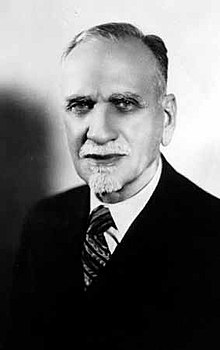Hashem Al-Atassi
| Hashim al-Atassi هاشم الأتاسي |
|
|---|---|
 |
|
| 4th President of Syria | |
|
In office 21 December 1936 – 7 July 1939 |
|
| Preceded by | Muhammad 'Ali Bay al-'Abid |
| Succeeded by | Bahij al-Khatib |
|
In office December 1949 – 24 December 1951 |
|
| Preceded by | Husni al-Za'im (Military Rule) |
| Succeeded by | Fawzi Selu (Military Rule) |
|
In office 1 March 1954 – 6 September 1955 |
|
| Preceded by | Adib Shishakli (Military Rule) |
| Succeeded by | Shukri al-Quwatli |
| 2nd Prime Minister of Syria | |
|
In office 17 August 1949 – 24 December 1949 |
|
| Preceded by | Muhsin al-Barazi |
| Succeeded by | Nazim al-Kudsi |
| President of the Syrian General Government | |
|
In office 3 May 1920 – 28 July 1920 |
|
| Monarch | Faisal I |
| Preceded by | Rida Pasha al-Rikabi |
| Succeeded by | Alaa al-Din al-Durubi Basha |
| President of the Constituent Assembly | |
|
In office 11 August 1928 – 6 September 1928 |
|
| Preceded by | Badi' Muwayyad |
| Succeeded by | Faris al-Khoury |
| Speaker of the Syrian National Congress | |
|
In office 11 December 1919 – 17 July 1920 |
|
| Preceded by | office established |
| Succeeded by | Badi' Muwayyad |
| Personal details | |
| Born | January 11, 1875 Homs, Ottoman Syria |
| Died | 5 December 1960 (aged 85) Homs, Syria |
| Political party |
National Bloc (1928–1947) People's Party (1948–1960) |
Hashim Khalid al-Atassi (11 January 1875 – 5 December 1960) (Arabic: هاشم الأتاسي, Turkish: Haşim el Atasi) was a Syrian nationalist, statesman and its President from 1936 to 1939, 1949 to 1951, and 1954 to 1955.
He was born in Homs in 1875 to the large, landowning and politically active Atassi family. He studied public administration at the Mekteb-i Mülkiye in Istanbul, and graduated in 1895. He began his political career in 1888 in the Ottoman province of Beirut, and through the years up to 1918 served as Governor of Homs, Hama, Baalbek, Anatolia, and Jaffa, which included the then-small suburb of Tel Aviv. In 1920, after the World War I defeat of the Turks, he was elected chairman of the Syrian National Congress, the equivalent of a modern parliament. On 8 March 1920 that body declared independence as a constitutional monarchy, under Faisal I. He became prime minister during this short-lived period, for French occupation soon followed under the terms of the Sykes-Picot Agreement and a League of Nations Mandate (Also see: San Remo conference). During his tenure, Atassi appointed the veteran independence activist and statesman Abd al-Rahman Shahbandar, one of the leaders of the Syrian nationalist movement against the Ottoman Empire during World War I, as Foreign Minister. He delegated Shahbandar to formulate alliances between Syria and Europe, in a vain attempt to prevent the implementation of a French Mandate. France moved quickly to reverse Syrian independence. The French High Commissioner Henri Gouraud presented Faisal with an ultimatum, demanding the surrender of Aleppo to the French Army, the dismantling of the Syrian Army, the adaptation of the French franc in Syria, and the dissolution of the Atassi Government. Shahbandar's efforts to compromise with Gouraud proved futile, and Atassi's cabinet was dissolved on 24 July 1920, when the French defeated the Syrian Army at the Battle of Maysalun and imposed their mandate over Syria.
...
Wikipedia
